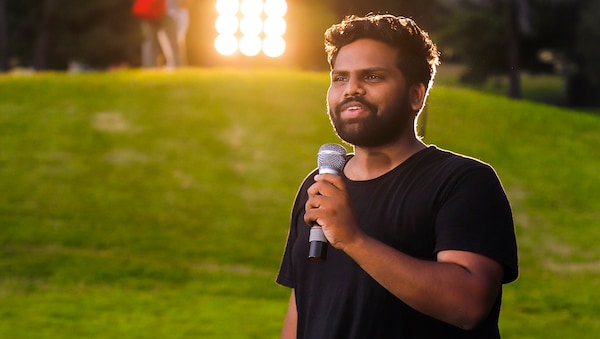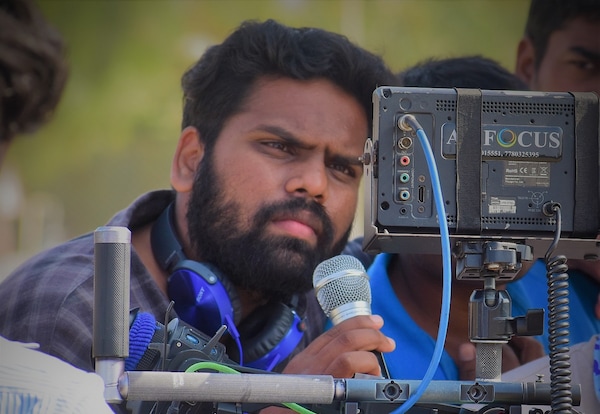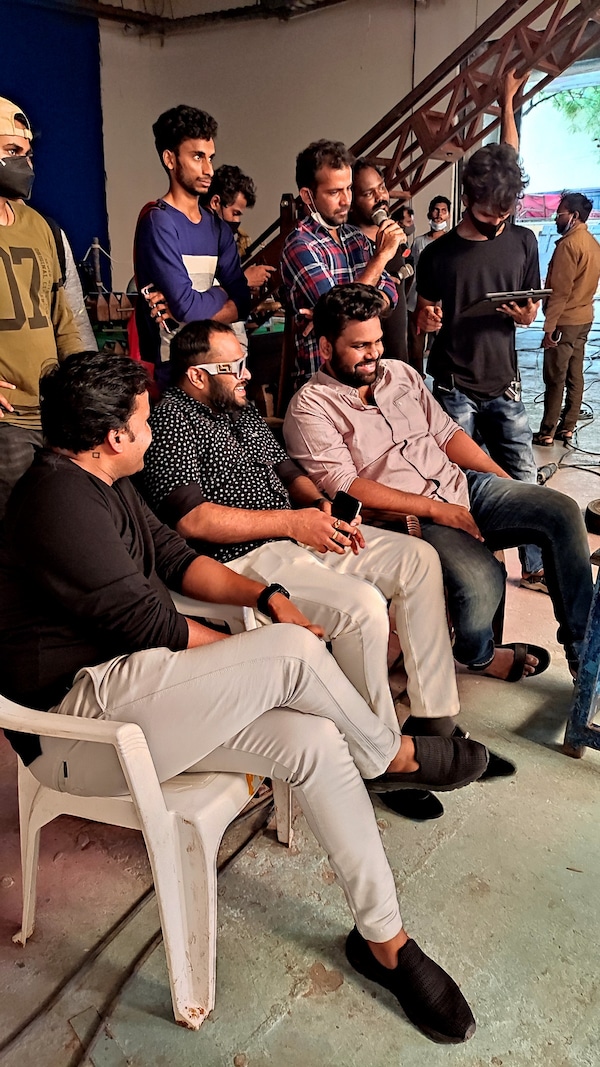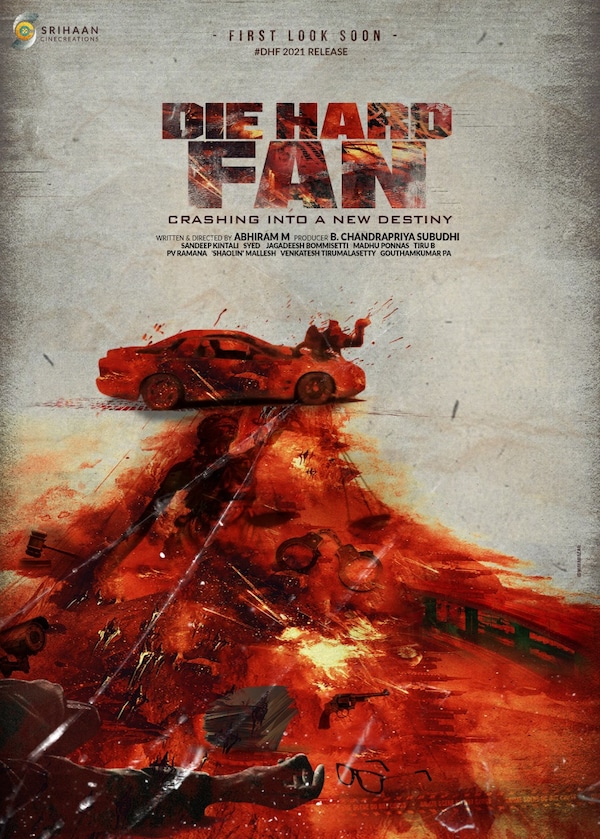Exclusive! Director Abhiram M: Convincing audiences to watch your film is nothing less than an achievement
The director of Ee Kathalo Pathralu Kalpitam and the upcoming crime comedy Die Hard Fan talks of his eventful journey and the various aspects that gave him the confidence to make a career in films

Last Updated: 03.25 PM, Nov 17, 2021
Srikakulam-born Abhiram M is another addition to a long list of engineers-turned-directors who're carving their niche in Telugu cinema. The youngster, who made his debut with this year's release Ee Kathalo Pathralu Kalpitam, is awaiting the release of his second film titled Die Hard Fan. Abhiram was known to be independent and self-sufficient since childhood, chancing his abilities to bail himself out of tricky situations, doing several part-time jobs to fund his filmmaking endeavours during his engineering days.
From ad films to short films and wedding videos, he learnt the ropes of storytelling gradually. While Abhiram wanted to become an actor initially, circumstances back home forced him to return to basics, where he took up a role as a mentor for a project at KL University(Guntur). However, the filmmaking bug had bitten him for good and regardless of how much he tried to distance himself from it, it kept coming back at him. Quite prepared for the challenges that lay ahead, Abhiram was a quick learner with great narration skills and made his presence felt in the industry. OTTplay tries to understand the budding filmmaker better in this candid chat.
Where and how did this journey begin?
I hail from Srikakulam, am an engineering graduate who went on to do short films, ad films, made experimental videos and geared up for a career in cinema along with a bunch of friends, even though we didn't know much about technique. Year after year, our awareness about equipment, storytelling grew while attending workshops and gaining knowledge through various sources. I wanted to become an actor first. Though I acted in about 30-40 short films and a few feature films, my career didn't take off. Being the eldest child in the family, I had a few responsibilities.
I was brought on board as a student mentor at KL University for a project about the smart village revolution. I was also involved in filming videos, documentaries that the university had used to depict the impact we made at the villages. I was also recruited for a leadership programme by a gentleman named Sai Vijay P, where students were groomed with life skills beyond academics. I realised I was mad about films soon and that I couldn't escape from it even during the university stint. I took to screenwriting shortly. I felt it was practical to make a career as a writer instead of an actor. I left my job, learnt the many nuances of the filmmaking craft, narrating scripts to people, making films and here I am, now a two-film old director.
How did your first film materialise?
I had readied a few scripts and started narrating them to many actors. One of my friends referred me to Pavan Tej Konidela, a relative of actor Chiranjeevi. He liked my script, instilled confidence in my abilities and didn't mind risking his launch project with a newcomer like me. My first film Ee Kathalo Pathralu Kalpitam released in March 2021. The film is currently streaming on Amazon Prime. The casting for the film worked well, it got a lot of views digitally, decent reviews and good ratings on IMDB.
A lot of people supported me during my short film days with scholarships, offered practical help and were an integral part of my journey. Though I couldn't work with them in my first film, I made sure they were a part of my second film Die Hard Fan. The shoot of my second film took off even before my first film was released. The producers of Die Hard Fan were associated with a few Ollywood (Odia) releases, Hindi albums before and they are making their entry into Telugu cinema. I have known them since my days in Srikakulam and they have been a great source of support.
What gave you the confidence to direct a film sans any industry experience?
If you work in around 20 short films, you'll have a clear idea of the practical problems that may arise on sets. When you work on a film, a production controller handles every possible aspect and the challenges are minimal. When you do a short film made on zero budget, you don't have such luxuries. You get to know the importance of all the crafts and learn to arrange everything that's required to shoot for a scene. Short films helped me attain command over the craft, practical knowledge, from poster design to film editing, getting work done, understanding budgets, man management and utilising resources properly.
In filmmaking, the banana is peeled and given to you, you don't know the pain. Only when you're pushed to your limits, will you explore or try something new, realise its pros and cons. You don't think about a few aspects when it's handed over to you easily. Having done short films and dealt with every possible issue that may arise on a set, I was mentally prepared to handle the situation and go about my work in a relaxed manner. Man management skills are more important than technical skills to make a good film. Even Sukumar garu had told recently that 80% of filmmaking is management skills and the rest is the craft. Managing producers, temperament of the actors, streamlining them to give their best is itself a big task. The rest is a cakewalk.

What were the major hurdles while directing your first film? How did you handle them?
The practical challenge for any first-time filmmaker is the lack of set experience, awareness of the budget. The producer was also a debutant. I made sure I didn't carry myself like a newcomer on sets. I behaved like a director with many films behind my back (laughs). The writer Syed and I have known each other for long. The cinematographer Sunil Kumar Nama was young, enthusiastic and looking to make a mark. I never faced a situation where people tried to dominate me or take me for a ride. Handling post-production, promotion and release were major obstacles. Getting the audience to watch your film is nothing less than an achievement. It's never the same for every film and every team has a different strategy according to the budget. I learned a lot through the process.
Where do you find inspiration for your stories? How do you put pen to paper?
We may come up with several interesting ideas as a writer in various genres observing various aspects of life, but I feel it's more practical to plan your story according to the budget and resources you have. I always had a few plots in mind which I know could be executed even with little resources. I wanted to make my first film with new faces at a shoestring budget and was lucky to have made it at a larger scale when I knew I had a better budget. Stories are always born out of real-life observations but what matters is how you present them.

Did your stint at the university help you with your film career by any means?
Even before I worked at KL University, I was very independent and did several part-time jobs in the management space to fund budgets for my ad films. I was into event management, had a startup firm called Chaaya Chithra that dealt with corporate, ad and wedding films. I had my own YouTube channel. I wanted to create more employment, was good at managing people, resources. Even during college, I was part of a media club, taking filmmaking classes, presenting seminars which eventually helped me land a job at KL University. They knew I could extract work well from people. Engaging with students, faculty, presenting the project, hosting awareness programmes in villages gave a new direction to my life. These experiences helped me immensely. Handling 200-300 people on a film set is not easy at all. Their work environment is decided by my reaction to a situation.

Tell us about your second film, Die Hard Fan.
Die Hard fan is a crime comedy and a thriller, unfolding over a single night. Priyanka Sharma (Savaari actress), Shiva (as a fan), Shakalaka Shankar, Noel Sean, Rajeev Kanakala, JC Chandu, Ravi Varma, Keshav Deepak play key roles. The film's shoot is complete. My regular collaborator Syed is the writer and Jagadeesh Bommisetti is the cinematographer. Madhu Ponnas has composed the music. B Chandrapriya Subudhi has produced it under Srihaan Cine Creations. Sandeep Kintali is the executive producer. We are aiming for a December release.
Is the film based on the relationship between a star and a fan? Were there challenges with the screenplay, given it's a tight script that unfolds over a single night?
Yes, to both, and Die Hard Fan is a completely screenplay-driven script. The title, we thought, is relatable, creates curiosity, is catchy and different. If anyone is a fan of a particular actor, their biggest desire is to meet them and take a snap with them. Shiva plays one such fan while the actress is Priyanka Sharma. His house is filled with her pictures, he admires her unconditionally. What will happen when such a fan receives a message from his favourite actress? In reality, a fan won't know how to react to such a situation. I wanted to come up with a story that revolved around a fan and a star and we built it brick by brick. Why will the celebrity go to meet her fan? How will the fan save her? You'll know when you watch.

 Premium
Premium